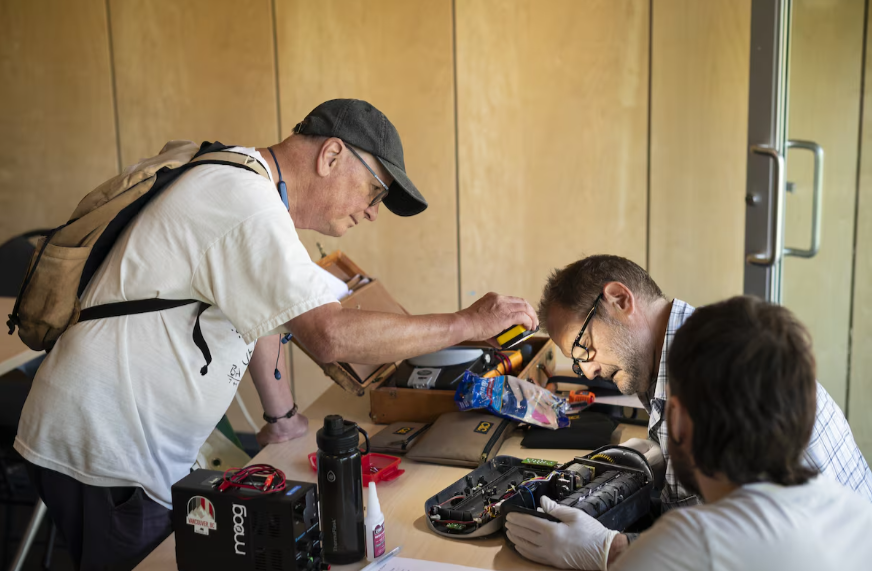At our recent repair café event, we were excited to see the community come together to fix their broken items, reducing waste and promoting sustainability. Our efforts, alongside those of other repair cafés across Metro Vancouver, were recently highlighted in an article by The Globe and Mail that explores the broader impact of the repair café movement and the growing “right to repair” movement. Below is a detailed summary of the key points discussed in the article.

Photo: TIJANA MARTIN/THE GLOBE AND MAIL
Repair Cafés: A Community-Focused Initiative
Repair cafés have become a regular fixture in Metro Vancouver, where a dedicated group of volunteers—including retired tradespeople, passionate amateur tinkerers, and UBC electrical engineering students—spend a few hours each month helping locals repair their broken items. These events, organized by the Society Promoting Environmental Conservation (SPEC) in partnership with the City of Vancouver, accept a variety of items, including computers, clothing, bicycles, and small appliances. The goal, as highlighted by The Globe and Mail, is to reduce waste and push back against the widespread practice of planned obsolescence.
Extending the Life of Our Possessions
Brian Wong, SPEC’s repair café coordinator, is quoted in The Globe and Mail article, emphasizing the importance of extending the life of our possessions: “We need to utilize what we have and extend the life of it. We can’t continue on the same way of consuming.” With a 70-percent repair success rate, these cafés are not only helping individuals fix their belongings but also challenging the throwaway culture that dominates consumer behavior today.
The Broader Right to Repair Movement
As reported by The Globe and Mail, the repair cafés are part of a broader movement advocating for the “right to repair,” which calls for legislation requiring product manufacturers to provide the necessary tools, parts, and information for repairs. Advocates argue that making repairs more accessible would significantly reduce waste, curb hyperconsumption, and save consumers money in the long run. Colin Deacon, an independent senator from Nova Scotia, is quoted in the article stating, “If we can’t repair, if we can’t maintain, we’re forced to replace. It’s an environmental and economic burden on society.”
Challenges Facing the Right to Repair
Despite widespread support for the right to repair—The Globe and Mail notes that 90 percent of Canadians want to see related legislation—many face significant challenges when it comes to actually repairing their items. These challenges include limited access to repair tools and parts, complicated product designs, digital locks, and restrictive warranties. Experts like Alissa Centivany, an assistant professor at Western University, are cited in the article, highlighting that manufacturers often use “sophisticated tactics to make repair costly, inconvenient, [and] inaccessible,” pushing consumers toward replacement rather than repair.
Momentum Grows for Right to Repair Legislation
The movement is gaining momentum, as detailed in The Globe and Mail, with several U.S. states and Quebec already enacting right-to-repair laws. The Canadian federal government has also signaled its support, with promises to introduce legislation and consultations in the near future. However, there is still much work to be done to ensure that consumers have the ability and means to repair their items without facing prohibitive costs or barriers.
The Role of SPEC’s Repair Cafés in Promoting Sustainability
As more attention is drawn to the right to repair, initiatives like SPEC’s repair cafés, which were highlighted in The Globe and Mail article, play a crucial role in empowering communities to take action and make more sustainable choices. By supporting these efforts through volunteering, supporting organizations, and advocating for legislative change, we can all contribute to a more sustainable future where repairing, rather than replacing, becomes the norm.
Accessing the Full Article
For those interested in reading the full article from The Globe and Mail, it’s available on their website. Please be aware that access to the full article may require a subscription or purchase.
Next Steps
Want to contribute to the Right to Repair Movement and Repair Cafes?
- Consider adding your thoughts to the Federal Governments’ A Right to Repair consultation for Home Appliances and Consumer Electronics survey
- Volunteer at a Repair Cafe – there are a variety of positions available from greeter to fixer!
- Donate to the cause – SPEC relies on the generous donation from people like you to continue our programming and projects. Any amount makes a difference and is deeply appreciated by our small (but mighty) team!